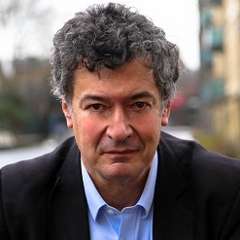Neither Prokofiev nor Dutilleux is a exactly a failsafe at the box office, and the combination of both - and a rainy afternoon - left quite a few seats unclaimed at last night's Prom by the London Symphony Orchestra, conducted by Valery Gergiev.
Which was a shame. Because, while orchestra after orchestra gets to show off its wares at the Proms, and one might hear orchestral playing as good as this, I very much doubt if one would, or indeed could, hear an orchestra deliver the transcendent quality which the LSO offered throughout last night's concert.
Whether it be the LSO's astounding first violin section, playing as one indivisible instrument in the opening movement of Prokoviev's Classical Symphony, or the flutes doing impossible acrobatics at crazy speed in the final movement; whether it was (in my case) hearing for the first time a quite outrageously good Italian bass clarinettist who has joined the orchestra, delivering a stunning solo in the Dutilleux concerto, one is left with the impression that the LSO of 2011 does not have a weak link anywhere. I am sure that this sheer quality in every chair will be my most abiding memory of Prom 52.
Prokoviev's Classical Symphony, which the composer wrote at the age of 25 in 1916-17, is just a quarter of an hour long. Gergiev gave the first movement calm and poise. It may carry the marking allegro but there was a decided touch of moderato. But rather than the stately tempo making it more ponderous, textures became more miraculously transparent and weightless. If Gergiev's way with Prokofiev can often be to hustle it, to drive it forwards, in this movement and in the first three movements of the symphony he was casting exactly the opposite spell: drenching the music with warmth, charm and playfulness.
In the second larghetto movement, the bassoons were to the fore, as soloists and blending. Gergiev made sure that the short third movement gavotte - it lasts less than two minutes - which Prokofiev purloined for the ballet Romeo and Juliet, was neither blinked nor missed, sprinkling plenty of rubato into the mix.
But the final molto vivace movement was propelled at unsparing, dare-you speed. Gergiev's had an unmistakeable mischievous glint in his eye. His final gesture also had charm: while the orchestra was obliged to find its own way to the secco exit, Gergiev's hands were already crossed over his cummerbund, his face sporting a faux-innocent "nothing-to-do-with-me" smile.
Dutilleux's violin concerto L'arbre des Songes was written for Isaac Stern, who premiered it in 1986. The violin soloist dialogues with various sections of the orchestra in turn, but has special partnership the cimbalom player. This was a bond which stuck: Dutilleux' next work - Mystère de l'instant - also featured strings and cimbalom. There are moments in this piece of anger, and indeed of virtuoso display by both solist and orchestra. There is one moment of pre-ordained chaos, still with the conductor beating time, where the violinist can tune, other players are not held to prescribed notation. But the moments which stand out are those of quiet repose and beauty, reminiscent of the Berg violin concerto.
Dutilleux has described his temperamental problem when faced with writing a violin concerto: it really didn't come naturally to him:
"Even with a close study of Paganini’s caprices, Ysaÿe’s sonatas, and many of Enesco’s scores, I personally still felt incapable of writing a bravura piece," he said. Nevertheless, Leonidas Kovakos, who has performed the piece before with Gergiev and the LSO, proved a fine, characterful soloist. The piece seemed shorter than twenty five minutes, and certainly did not outstay its welcome.
Slava's Fanfare by Dutilleux, which opened the second half, is no more than a very shortest of gestures of salute. It was written to celebrate the 70th birthday of Rostropovich in 1997. Both as cellist and as conductor, Rostropovich commissioned works from Dutilleux, so the piece is clearly a thank you. Receiving its Proms premiere last night, it is scored for trumpets, trombones and percussion, with piccolos joining in at the end. I picked up a clear reference in the solo trumpet part to the first cello statement of the theme of the Dvorak 'cello concerto. I'm sure that wasn't an accident...
The hallmark of the final work, Prokoviev's 5th Symphony, as David Nice points out in the Proms programme note, is not so much the declared programme of "a symphony to the grandeur of the human spirit" - those are the kind of words with which it was necessary to curry favour with Stalin - rather, the message of the piece seems to be that innocent and heroic intentions may keep rising up, but they will always be crushed by weightier forces. The opening statements are innocent, bucolic, but the bigger machine, the ineluctable drift into polytonality subverts the good intentions. This happens again and again, and Gergiev and his players brought out the progression to malice every time.
Phrases are caressed, loved, but danger always lurks in this piece. The lower voices will sink by a semitone leaving the aspirational melodic line stranded, undermined, vulnerable to be stamped on. In the slow movement, the attempts to grieve find themselves accompanied by a nagging, spitting side drum. Perhaps the clearest, cruellest example comes right at the end. Four string principals set off playing sweetly, collegially as a string quartet, but their playing is mercilessly stamped on by the closing chords.
If another orchestra can portray this composer's dark vision from wartime more vividly, take me to hear it.


